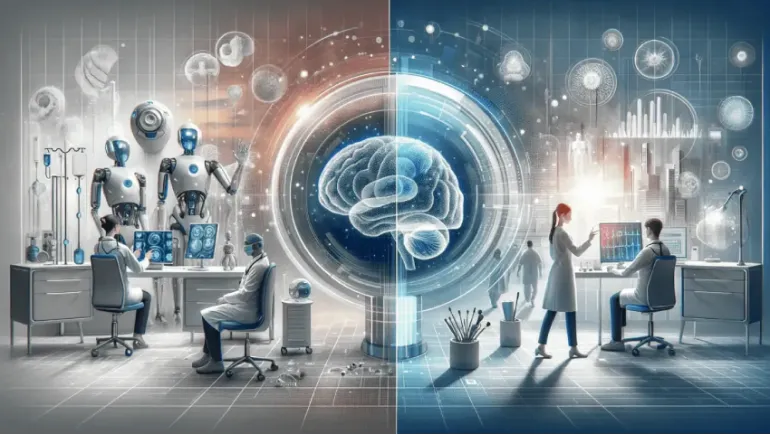
Artificial Intelligence (AI) is rapidly transforming the healthcare sector, revolutionizing the way medical professionals diagnose, treat, and manage patient care. As AI technologies evolve, they offer unprecedented opportunities to enhance efficiency, accuracy, and personalized care. The future of AI in healthcare is promising, with innovations that are poised to make healthcare more accessible, cost-effective, and patient-centered.
One of the most significant impacts of AI in healthcare is its ability to improve diagnostic accuracy. AI algorithms, particularly those based on machine learning and deep learning, are becoming increasingly adept at analyzing complex medical data, such as imaging scans, lab results, and genetic information. For instance, AI systems are being used to detect early signs of diseases like cancer, heart conditions, and neurological disorders with high precision. As these technologies become more refined, they could significantly reduce diagnostic errors and improve early detection rates, leading to better outcomes for patients.
AI has the potential to revolutionize personalized medicine by tailoring treatment plans to the unique needs of each patient. Through the analysis of vast amounts of patient data, including medical history, genetic information, and lifestyle factors, AI can predict how an individual might respond to certain treatments. This allows for the creation of personalized therapies that are more effective and have fewer side effects. In the future, AI could enable real-time adjustments to treatment plans based on how a patient is responding, further optimizing care.
The traditional drug discovery process is time-consuming and expensive, often taking years to develop and approve new treatments. AI is accelerating this process by analyzing large datasets to identify potential drug candidates more quickly and efficiently. AI algorithms can simulate how different compounds interact with the human body, predicting their efficacy and safety. This not only speeds up the drug discovery process but also reduces the cost of bringing new treatments to market. In the future, AI could significantly reduce the time it takes to develop life-saving medications.
AI-powered virtual health assistants are already being used to support healthcare providers and patients. These virtual assistants can perform a range of tasks, from answering patient queries and scheduling appointments to providing medication reminders and offering health advice. As AI technologies become more sophisticated, virtual health assistants will become even more capable of managing chronic conditions, monitoring patients’ health in real-time, and providing personalized recommendations. This can reduce the burden on healthcare professionals and allow patients to take a more active role in managing their health.
The rise of wearable health technologies, such as smartwatches and fitness trackers, is enabling real-time monitoring of patients' vital signs. AI can analyze the data from these devices to detect anomalies and alert healthcare providers to potential health issues before they become critical. In the future, AI-driven remote monitoring systems will become an integral part of patient care, particularly for individuals with chronic conditions like diabetes or heart disease. This continuous monitoring can lead to earlier interventions and reduce the need for hospitalizations, ultimately improving patient outcomes and reducing healthcare costs.
While AI offers tremendous potential in healthcare, it also raises several challenges and ethical concerns. Issues related to data privacy, security, and the ethical use of AI in decision-making need to be addressed. Ensuring that AI systems are transparent and unbiased is crucial to maintaining patient trust and avoiding disparities in healthcare access and treatment. Moreover, healthcare professionals must be trained to effectively integrate AI into their practices and interpret AI-driven insights while maintaining the human touch that is essential in patient care.
The future of AI in healthcare is bright, with continued advancements in technology poised to further enhance patient care. As AI becomes more integrated into healthcare systems, it will lead to more accurate diagnoses, personalized treatments, and efficient management of healthcare resources. However, collaboration between healthcare providers, technologists, and regulators will be essential to ensure that AI is implemented in a way that benefits everyone, from patients to medical professionals.
In conclusion, AI holds immense potential to reshape the healthcare landscape by improving patient outcomes, enhancing efficiency, and driving innovation. While there are challenges to overcome, the future of AI in healthcare is full of possibilities that promise to revolutionize the industry for the better.












Comments
There are no comments for this Article.